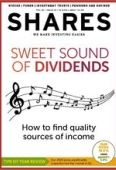Archived article
Please note that tax, investment, pension and ISA rules can change and the information and any views contained in this article may now be inaccurate.
Why consumer-facing companies are among London’s most-shorted stocks

Institutional investors continue to bet against consumer-facing companies, despite the International Monetary Fund predicting that advanced economies including the UK could return to ultra-low interest rates once inflation is tamed.
The IMF argues recent increases in interest rates are likely to prove temporary. When inflation is brought back under control, it says central banks are likely to ease monetary policy and bring interest rates back toward pre-pandemic levels.
Forecasts from the Office for Budget Responsibility show the UK will avoid recession this year, yet it still sees the economy contracting overall in 2023 and has warned living standards are expected to fall by the largest amount since records began.
The latest figures from BRC and KPMG show UK retail sales rose by 5.1% in March, but volumes fell as households prioritised spending on essentials with inflation continuing to bite.
Hard-pressed consumers continue to count their pennies which might explain why consumer-facing companies dominate the list of most-shorted stocks on the UK stock market.
Loss-making Ocado (OCDO) is London’s most-shorted stock with 6.1% of the shares out on loan after its joint venture with Marks & Spencer (MKS) suffered a 7.5% drop in its first quarter basket size as trading remained ‘challenging’.
Others in short-sellers’ crosshairs are online fast-fashion retailers ASOS (ASC) and Boohoo (BOO:AIM) as well as online greetings cards seller Moonpig (MOON).
Institutional investors are also betting against home improvement giant Kingfisher (KGF), a big beneficiary of a now-fading lockdown DIY boom, which saw like-for-like sales soften 2.1% in the year to January 2023.
In terms of current trading, Kingfisher reported (21 March) ‘broadly flat’ year-on-year big-ticket sales as it laps demanding comparatives, while short-sellers are also lining up against the likes of unloved e-commerce brand platform provider THG (THG) and indebted floor coverings manufacturer Victoria (VCP:AIM).
Last November, Victoria warned it was likely that disposable incomes in some markets would come under further pressure from higher interest rates and inflation, so it might struggle to push through further price increases to offset higher input costs.
Important information:
These articles are provided by Shares magazine which is published by AJ Bell Media, a part of AJ Bell. Shares is not written by AJ Bell.
Shares is provided for your general information and use and is not a personal recommendation to invest. It is not intended to be relied upon by you in making or not making any investment decisions. The investments referred to in these articles will not be suitable for all investors. If in doubt please seek appropriate independent financial advice.
Investors acting on the information in these articles do so at their own risk and AJ Bell Media and its staff do not accept liability for losses suffered by investors as a result of their investment decisions.
Issue contents
Book reviews
Editor's View
Feature
Great Ideas
- Buy Empiric at a big discount to the other main player in student property
- Laboratory owner offers a cheap way into a growing specialist market
- Brunner: a great way to invest in stocks around the world on the cheap
- Rathbones raises its sights with £100 billion Investec wealth deal
- Our top picks for 2023 have made a superb start to the year
 magazine
magazine








